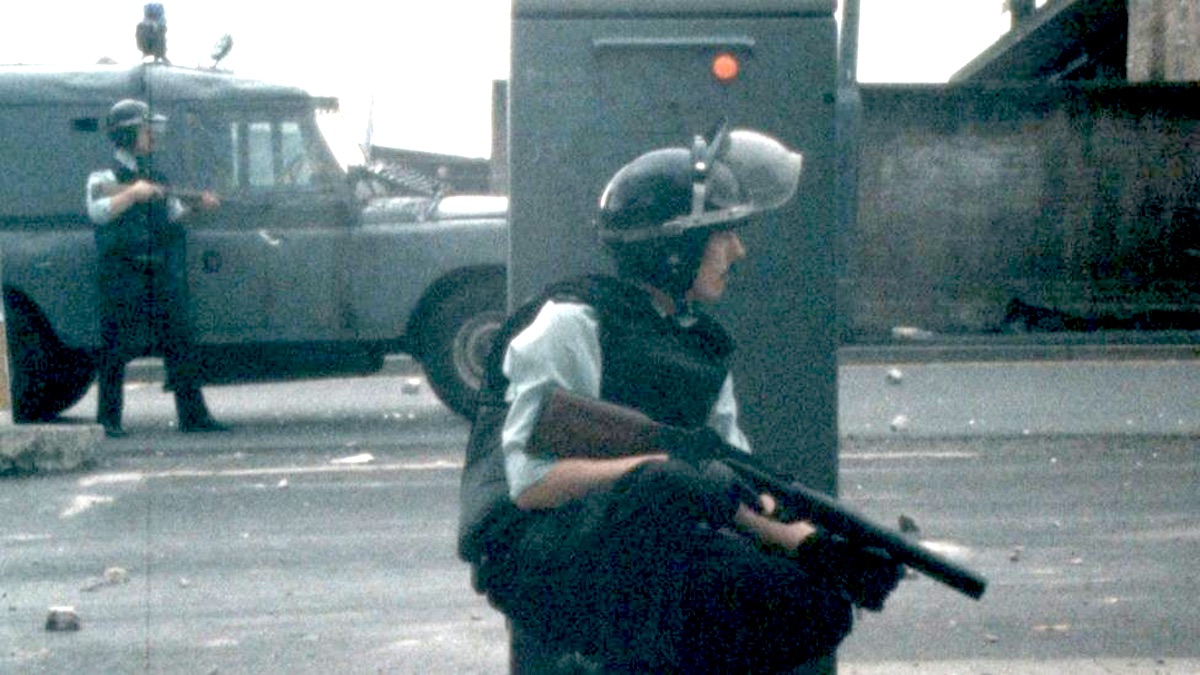
The British Crown Forces hid their role in the deaths of children killed by rubber and plastic bullets during the conflict, it has emerged.
In a new BBC Spotlight documentary, the show has uncovered declassified material that reveals the British Army knew it was too dangerous to fire the bullets at children, but it continued to do so.
Plastic and rubber bullets were invented by the British for use in the north of Ireland to suppress resistance without causing large-scale massacres.
Roughly 130,000 have been fired during the conflict, killing seventeen people, including eight children. Others suffered serious injuries, including brain damage and blinding.
Declassified documents also show that the RUC police deployed a plastic bullet gun never cleared for use against people and which had been only tested on animals. The PSNI, which took over from the RUC following a rebrand in 2001, continues to use the same weaponry.
The youngest person to die was 10-year-old Stephen Geddis who was hit by a British Army plastic bullet at Divis Flats in Belfast in 1975. Stephen’s brother, Jim Geddis, told the Spotlight programme: “I remember him being fairly timid. A quiet kid. I’d see him with his little friends. Just an unassuming kid.
“This little guy never got to grow up and get married, have children of his own. Never happened.”
Last year an inquest concluded Stephen was out playing and there was no justification for his shooting.
Documents uncovered during the inquest revealed that in 1971 the Army’s own Land Operations Manual stated baton rounds should not be used against children – but this instruction was never passed on to soldiers.
The Geddis family’s lawyer Padraig O’Muirigh said there is “clear evidence of a cover up”.
In 1981, 15-year-old Paul Whitters was hit by a plastic bullet fired by the RUC during street disturbances in Derry. The recently declassified government documents have revealed the gun used by the RUC in his shooting was never fully medically tested for its potential risks to civilians. Neither the public nor the Whitters family were ever told.
Sinn Féin’s Gerry Kelly has said those injured and families of those killed by rubber and plastic bullets deserve to know the truth about why those bullets continued to be used against children.
“For 50 years this information has been hidden from the public and courts, and at no stage did the British government disclose to courts that they shouldn’t be used against children.
“This would also have impacted on compensation cases for people injured by these weapons. Those injured and families of those killed by plastic bullets deserve to know the truth.
“The British government needs to come clean about their policy of continuing with the use of plastic bullets.”
Lasair Dhearg also hit out at the comments of Colonel Richard Kemp, who commanded British troops and who told the documentary that the plastic bullet had been “a lifesaver” for British soldiers and the public alike.
Aindriú Mac Ruaidhrí, Lasair Dhearg Belfast Chairperson said, “The victims and the families who have suffered at the hands of these fatal shootings, demand answers, and justice. Richard Kemp’s comments have added further insult to those families who still grieve for lost loved ones, and who will never see plastic bullets as anything other than life takers.”
Meanwhile, a campaign group has criticised a High Court ruling that a British soldier who partially blinded a Catholic schoolboy with a plastic bullet was “justified”.
The United Campaign Against Plastic Bullets (UCAPB) spoke out after Lurgan man Gavin McKenna lost a compensation claim last month. He was 13 when he suffered permanent eye damage after being struck by a plastic bullet fired by a British soldier in Lurgan in 1997.
During summing up the judge described the injury as “very unfortunate” but cited Mr McKenna’s membership of Republican Sinn Féin as a reason to dismiss the compensation claim.
His lawyer Gavin Booth, of Phoenix law has confirmed he intends to appeal the judgement. Mark Kelly, chair of the UCAPB, has registered the campaign group’s support for the appeal.
“We do not accept that plastic bullets are safe or that any circumstances exist that make them safe or justified to use,” he said. “They are lethal weapons and are used indiscriminately, even when used in accordance with so-called guidelines; a convenient cover that permits their continued use.”
![[Irish Republican News]](https://republican-news.org/graphics/title_gifs/rn.gif)
![[Irish Republican News]](https://republican-news.org/graphics/title_gifs/harp.gif)

